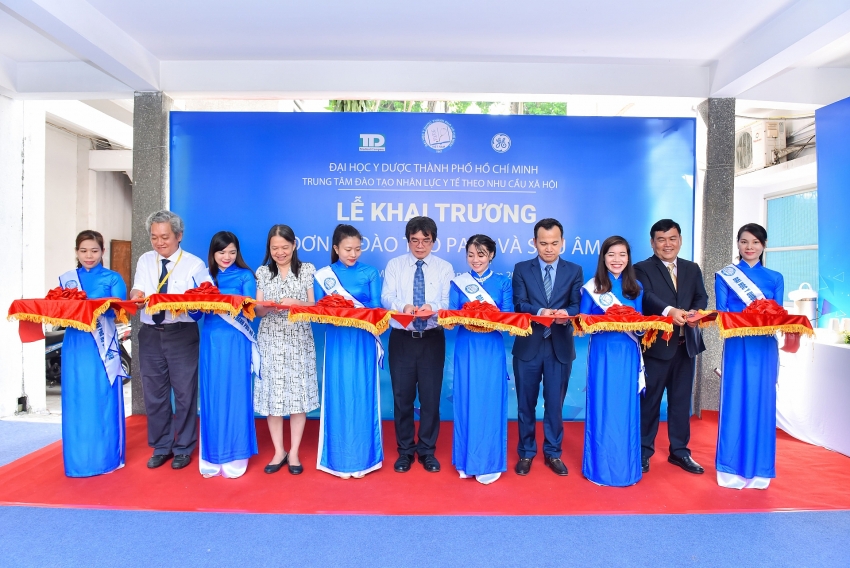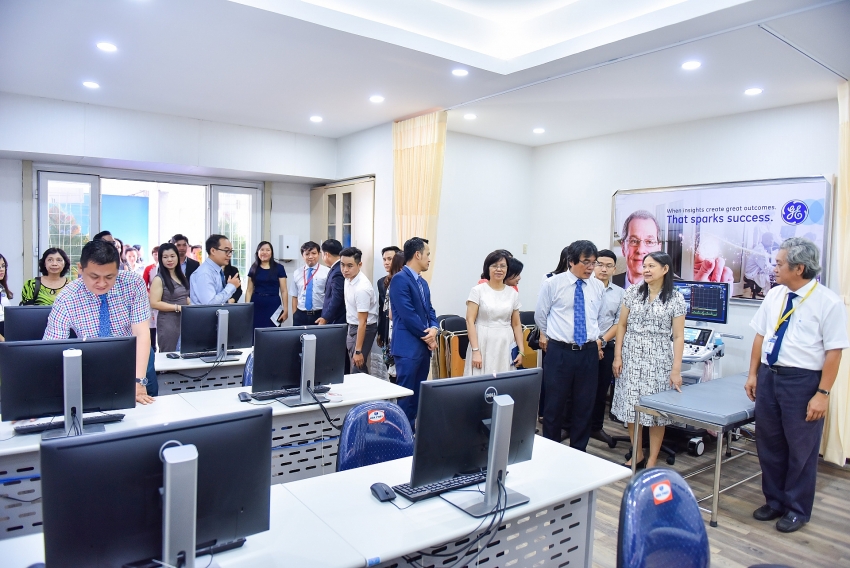A leap in healthcare with digital curriculum with GE Healthcare
 |
| Representatives from GE Healthcare, UMP, and TD Medical join PACS's launching ceremony |
Ho Chi Minh City Medicine and Pharmacy University (UMP) in collaboration with GE Healthcare and privately-held TD Medical have just launched the PACs Education Unit.
The impact of the Industrial Revolution 4.0 on the medical industry is becoming increasingly apparent; as one of the key human resource training centres in Vietnam, UMP has been striving to update scientific and technological achievements to effectively contribute to healthcare services for people.
With PACs Education Unit, more than 200 clinicians will be trained annually to use digital healthcare tools in practice; the curriculum is also opened to working clinicians across the country to upgrade their skills.
 |
| Visiting the new training unit PACS |
“Almost any industry globally, including healthcare, has started to leverage technology and digital solutions to work smarter and faster. As educators, we recognise the importance of starting early on this digital mindset early to ensure that our student skills will still be relevant upon graduation.
To that end, we value this partnership with GE Healthcare and TD Medical. Their experience across implementation and industry best practices will ensure that our students get access to the latest solutions and technology to hone their skills,” said Chau Ngoc Hoa, head of PACs unit.
This move of UMP is aligned to the priorities of the Ministry of Health.
| In recent years, the government has been promoting policies on applying digital tools into management and operations in general, and specifically in the healthcare sector. |
In recent years, the government has been promoting policies on applying digital tools into management and operations in general, and specifically in the healthcare sector.
Digital tools are expected to be the foundation for a complete digitalisation in the next few years, with an expected high adoption of Hospital Information System (HIS) as well as Laboratory Information System (LIS), integrated Radiology Information System (RIS) and Picture Archiving and Communication System (PACS), and Electronic Medical Record (EMR), from which to complete government’s goals.
“We are heartened to note that the Vietnamese government is keen to drive more digital solutions across the country. In the context of healthcare, digital solutions have the potential to improve hospital operational and clinical excellence– all of which, ultimately impacts patient outcome.
 |
| Son Pham, GE Healthcare Vietnam country manager |
“GE Healthcare is privileged for the opportunity to partner a prestigious local institution such as UMP and make a long-term contribution in enhancing the healthcare standards of Vietnam,” said Son Pham, country manager for GE Healthcare Vietnam.
At the education centre in UMP, students will be able to undergo technical and hands-on training in GE’s Enterprise Imaging Solutions such as CentricityTM Universal Viewer and Advanced Visualisation.
It delivers comprehensive reading across hospitals, reporting and collaboration across care pathways to help improve clinical efficiency and drive enhanced patient outcomes.
One of the features of Centricity Universal Viewer is Zero Footprint Viewer (ZFP), which can be used to review images with a team, patient or family member. For example, surgeons can use Centricity Universal Viewer ZFP to review images and surgery plans, then also reference images during intricate surgeries to locate key anatomy.
Cardiologists, pediatricians and orthopedic surgeons can bring up images on portable devices at the bedside or in their office to share with patients and families as they discuss care plans.
Referring physicians can educate and comfort patients by explaining procedures and sharing knowledge. It all adds up to swifter decision making and more timely and efficient care for the patient.
Studies have shown that with mobile access capabilities, there is a 32 per cent reduction in duplicated tests with anytime access to data.
What the stars mean:
★ Poor ★ ★ Promising ★★★ Good ★★★★ Very good ★★★★★ Exceptional
Related Contents
Latest News
More News
- Addressing Vietnam's energy challenges with aeroderivative gas turbines (February 28, 2023 | 09:33)
- How to sprint ahead in 2023’s worldwide energy priorities (February 08, 2023 | 13:55)
- Boosting Vietnam's grid stability through gas turbine technology (November 22, 2022 | 20:02)
- Healthcare trio collaborates to provide thousands of free breast scans (October 27, 2022 | 17:19)
- GE Healthcare's vision for AI-backed radiology (September 29, 2022 | 11:53)
- GE brand trio to shape the future of key industries (July 19, 2022 | 15:35)
- GE unveiling brand names and defining future (July 19, 2022 | 15:16)
- GE: the shortest route towards sustainability (July 18, 2022 | 08:00)
- Be proactive in an uncertain world (May 20, 2022 | 11:40)
- GE secures first 9HA combined cycle power plant order in Vietnam (May 16, 2022 | 17:06)

 Tag:
Tag:


























 Mobile Version
Mobile Version